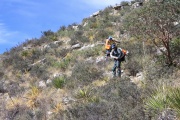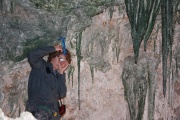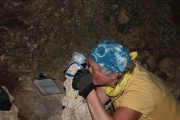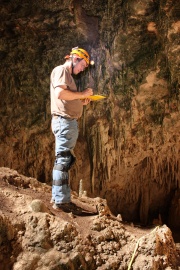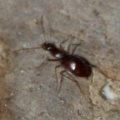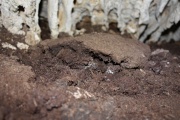October HGRP, 2011
From LagWiki
| October HGRP | |
|---|---|
| Location | High Guads |
| Author | William Tucker |
| Date | October 29-30, 2011 |
The October, 2011 HGRP was a scaled back affair with only seasoned HGRP participants invited. The usual organizer, Jennifer Foote, had a conflict with another caving trip and was unable to attend. Phyllis Boneau and William Tucker were asked to lead in her absense with Phyllis doing most of the work involved.
The last weekend of October, 2011 found Tammy and I along with several other HGRP participants camping deep in the Guadalupe Mountains. We camped at an unusual site to allow for hopefully easier access to one of the caves on our list of projects.
Saturday
On Saturday, I was assigned to lead a small group to continue surveying a remote and rarely visited cave. Tammy Tucker and Janice Tucker were to accompany me. The rest of the HGRP participants drove to Virgin for restoration work.
My team left camp at 10:00 AM to hike to our target cave. This was my second survey trip to this cave and we had plans to make good progress toward completing the survey, but did not expect to complete it on this trip.
On my first trip to this cave, the hike had proved to be difficult so a better way was sought.
This time, we started from a new location, hoping to stay on the ridge top the whole way. The distance was longer but we hoped the new path would prove easier. Phyllis had commented that she thought the hike would be "a cinch". Her characterization was overly optimistic. Hiking time to the cave, including rigging and dropping, was approximately 2 hours. This was about the same as the other way but was considerably easier nonetheless.
There is very little to rig to outside of this cave. On my first trip, I had rigged around a large rock protruding from the ground about 9 inches. I had shaken the rock and it seemed to be well embedded. This time, I shook it again to prove to Tammy and Janice that it was trustworthy and ... it moved. So, we looked around for another anchor. We selected a juniper some distance from the entrance. It seemed to be very well rooted with multiple trunks and proved more than adequate assuming you had enough rope. We did.
We rappelled into the cave to begin our survey where I had left off last time. This was Tammy's and Janice's first trip to this cave and they seemed very impressed. It is a beautiful cave and is very interesting, especially from an inventory perspective. There are large, very large, dogtooth spar crystals everywhere. Large columns; helictites of all kinds; corrosion residues; boxwork; and abundant guano; and other interesting items are found throughout the cave. The guano is so abundant that it is apparant that this cave was once a major roost for summer bats.
All three genera of beetles on the inventory form are found in this cave.
We saw a few (two or three, maybe four) bats on this trip and because of the bat we had seen on the first trip, and the guano, we took a bat monitor with us to leave in the cave overnight.
We did 5 survey shots splaying from a stalagmite in the center of the main room for 126 feet of survey and about 1600 square feet of area. Janice and Tammy did inventory and instruments while I sketched.
We left the cave at around 5:30 PM and hiked back to camp arriving there at 7:30 PM. We all crowded into Phyllis's large tent for the evening to enjoy the food and comaraderie.
Sunday
On Sunday, I led a different team to the same cave to retrieve the bat monitor and continue the survey. On this trip, Phyllis Boneau, Mark Bulman and Jason Walz accompanied me.
We left camp at 9:30 AM each wearing orange vests as this was hunting season. On this trip, I did instruments (fore and back), Mark set stations, Phyllis did inventory and Jason sketched. Jason was very impressed with the cave saying at one point that he may "have a new favorite cave".
We commented and discussed the guano at length and decided that it may be very old. We found abundant signs of bat staining on the ceiling and there are stains on the flowstone and breakdown on the floor which may be from bat urine. We also saw several swallow nests, feathers and broken egg shells. One of the nests had horizontal bands of alternating dark and light colors. It looked like it was built from a combination of mud and guano and was striped like a barber pole.
We did 5 shots for almost 76 feet of survey working mostly under some large breakdown.
We returned to camp at 4:30 PM.
